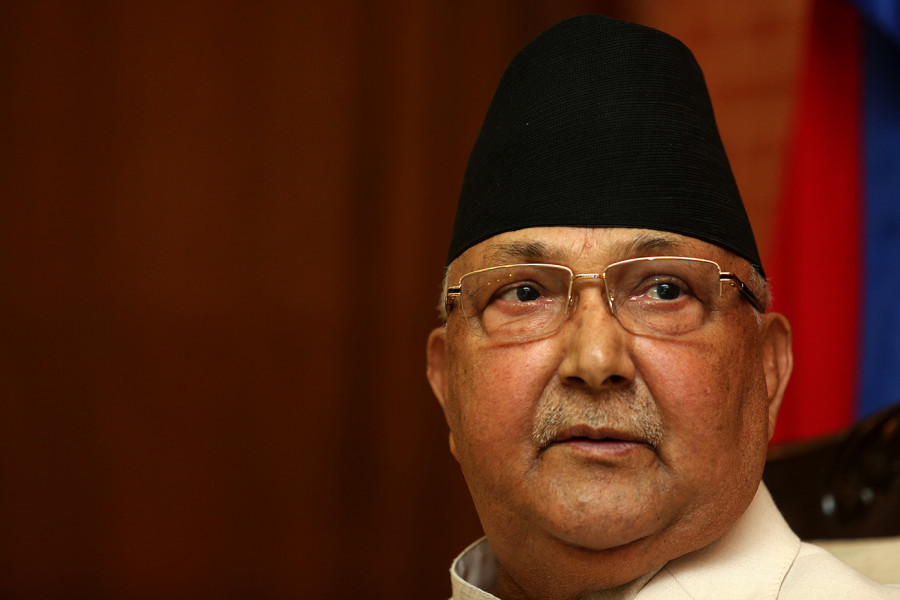National
Oli’s unconstitutional House dissolution leads to unwanted burden on state treasury
Experts say unnecessary expenditure from the state coffers should be considered corruption.
Prithvi Man Shrestha
After the government announced snap polls on December 20, the Election Commission started preparing for it—the constitutional body spent nearly Rs100 million on it. The government also went on a spending spree to organise events to inaugurate development projects aimed at influencing voters.
But after the Supreme Court reinstated the House of Representatives on Tuesday, it is now clear that the elections scheduled for April 30 and May 10 have been called off.
Analysts say that the ‘unconstitutional move’ by Prime Minister KP Sharma Oli resulted in unnecessary expenditure from the state coffers, and this should be considered corruption.
“Expenses made from the state treasury for the benefit of oneself and one’s people by violating the constitution and laws is akin to corruption,” said Khem Raj Regmi, former president of Transparency International Nepal, an anti-corruption watchdog.
“Not only has the Election Commission spent millions to prepare for polls, but a sizable chunk of money has also been spent on various rallies and events,” said Regmi. “State resources or donations from various interest groups must have been spent on the rallies. Politicians tend to compensate for such financial support with policy corruption.”
After the polls were announced, the Oli government had been reduced to caretaker status. Under such a government, the bureaucracy does not perform its duty effectively and this affects the quality of service delivery, experts say. “Depriving people of development and service delivery illegally also amounts to corruption,” Regmi claimed.
According to contractors, the government has been reluctant to implement development projects after the polls were announced. “Even though it is time to speed up the implementation of development projects, we see little effort from the bureaucracy to do so. The government is also delaying payment for completed works,” said Rabi Singh, president of the Federation of Contractors' Association of Nepal.
The prime minister’s move not only translated into losses to the state but also affected the implementation of development projects. While the cost of slow implementation of the development project is not visible, the election body’s expenses for poll preparations are visible.
“We had spent around Rs100 million to make necessary preparations for the polls when the Supreme Court announced its verdict,” said Raj Kumar Shrestha, spokesperson for the commission. “We had released over Rs40 million to our district offices and an equivalent amount is estimated to have been spent by the commission's head office in Kathmandu.”
According to Shrestha, a large portion of the budget allocated for the district offices was spent on repairing and maintaining machines such as computers and printers. Updating the voters’ registration and making provisions for polling centres also cost money. “The head office spent its budget to repair equipment and vehicles, organise meetings, prepare laws, and provide incentives for employees to work overtime.”
According to the commission, it had finalised an updated voters’ list and was preparing to decide where to place the polling booths. It was preparing the election programme, code of conduct, procurement plan, election security plan, voters’ education materials, and orientation training for the employees assigned for holding the elections among others.
Shrestha said that the expenditure for most poll-related activities should not be considered wastages as they could be useful for future elections considering that the next elections for local, provincial, and federal elections are due in 2022.
“Had the Supreme Court delayed its verdict, money would have been wasted,” he said. The government had released around Rs1 billion to the commission for election preparations. Just over Rs7 billion budget was approved for the commission to hold the elections.
On the same day the Supreme Court issued its verdict reinstating the House of Representatives, the Election Commission had invited tender for procurement of 11 types of different products, including ballot box stickers, identity cards, poll books, security seals, stamps, markers, stamp pads, ink, polythene bags photocopy paper, glue sticks, stapler machines, rulers, scissors and pens, among others. But, the commission said that tender will be scrapped in view of the Supreme Court verdict.
After the court verdict, the poll body says it won’t spend additional money for elections. But, the expenses made by the state targeting the polls have yielded little to no benefit for the people.
Former Chief Commissioner of the Commission for Investigation of Abuse of Authority Surya Nath Upadhyay said time and resources were spent on preparations for elections due to Prime Minister Oli.
“The expenditure made by the election body may be useful for the future but millions of rupees were spent on rallies and events targeting the elections. The prime minister should be held accountable for this,” he said.
He said the Prime Minister’s move resulted in losses to the state resources. “The drive to inaugurate various development projects launched by the prime minister and ministers with much fanfare targeting elections has also resulted in the unwanted burden on the state resources,” said Upadhyay.




 16.12°C Kathmandu
16.12°C Kathmandu














